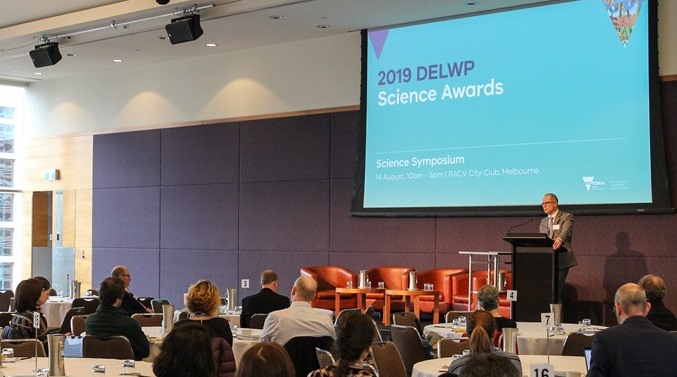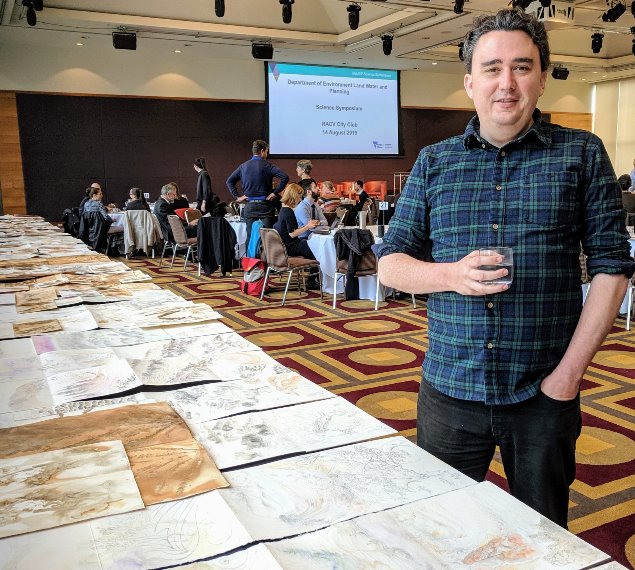DELWP’s Science Symposium was held over 3 days (Tuesday 18th- Thursday 20th August 2020) for DELWP and our partners, during National Science Week, and featured:
- presentations from our Scientific Reference Panel members
- a series of 3 minute ‘lightning’ talks
- DELWP Science Awards
- examples of sci-art that help us interpret and better engage with science.
The Science Symposium is being delivered as part of DELWP’s Science Implementation Plan, which provides a roadmap on how the Science Statement will drive stronger collaboration across the department and better recognise the value and impact of our scientific work by improving science visibility and connectivity. This year its going online and this means that participants can join in for the whole event or for a few minutes at a time.
The symposium is built around the theme of ‘Discoverability and Connectivity’. Science underpins all our work at DELWP and enables us to connect, involve and inform the Victorian community in evidence-based decision making which will be showcased through our ‘lightning’ talk series.
DELWP Science Reference Panel
To assist with DELWP’s science development, the DELWP Scientific Reference Panel has been established, and they delivered presentations on Day One of the Symposium. The Reference Panel provides advice and support to further embed science in the department’s day-to-day practice and create a strong science culture. Panel members were selected for their wealth of experience, exceptional collaboration record and capacity to lift the profile and impact of DELWP’s science. The members’ collective expertise represents the many dimensions of our department’s business and research. They are:
- Dr Georgia Garrard, Quantitative ecologist from RMIT University
- Dr Rosemary Hill, Principal Research Scientist with CSIRO Land and Water
- Dr Peter May, Bureau of Meteorology Head of Research
- Dr Jack Pascoe, Conservation Ecology Centre Conservation and Research Program Manager
- Professor Abbas Rajabifard, Head of the Infrastructure Engineering Department at the University of Melbourne
- Professor Gary Sheridan University of Melbourne Ecosystem and Forest Sciences expert Associate
- Dr Marta Yebra (DOCX, 353.0 KB), a Senior Lecturer in Environment and Engineering at the Australian National University
The 'lightning' and panel member talks are available online in our DELWP Science Symposium YouTube playlist. They can also be accessed from this list of presentations (DOCX, 4.4 MB) via links to each individual talk.
Lightning talks
Short ‘lightning’ talks at the Science Symposium on Day 2 provide a great way for us to connect with our colleagues and discover the breadth of DELWP research, in a very accessible way. In addition to DELWP staff, presenters are from some of our key partners including Zoos Victoria, Behaviour Works, Royal Botanic Gardens, Phillip Island Nature Parks and more.
The 'lightning' and panel member talks are available online in our DELWP Science Symposium YouTube playlist. They can also be accessed from this list of presentations (DOCX, 4.4 MB) via links to each individual talk.
Science Awards
The DELWP Science Awards acknowledge and celebrate our people and the fantastic scientific work they do. The awards were announced by DELWP Secretary John Bradley at the Science Symposium on Day 3, and highlighted the importance, quality, value, and impact of our science capability and our effective partnerships with other science collaborators. These awards help give DELWP’s science achievements greater visibility and recognise its role in meeting the major challenges faced by Government, industry and the community in a rapidly changing world.
The award categories and winners (congratulations to all!):

Staff from DELWP's Biodiversity Division and Parks Victoria won the David Ashton Biodiversity Science Award for their rapid analysis of the impacts of the bushfires on Victoria’s biodiversity and the identification of priorities for action as set out in the Biodiversity Bushfire Response and Recovery report.
This report released in January 2020, while the fires were still burning out of control, was widely acclaimed for its collaboration and use of cutting edge science and modelling and provided the critical evidence needed to respond to the fires and help our biodiversity’s recovery. It also formed the basis for the Victorian Government’s $17.5 million funding allocation to support the initial response and recovery.
Congratulations to Anne Buchan, Matt White, Billy Geary, Jeremy Hindell, Mark Norman, Fern Hames, Mark Whyte and David Attard. Support and input from other experts within DELWP and across other organisations were also vital.
Mitchell Stephen (Forest Fire Management & Operations Planner, and Science and Planning Graduate) and Evan Lewis ( Manager Forest Fire and Risk Assessment) received the Fire and Emergency Science Award for the work they did in collaboration with the University of Melbourne on the Impacts of Bushfire and Planned Burning on Residual Risk.
Their work shows us that planned burning has more of an effect on this risk than bushfires themselves
Tom Hill and Natasha Reid from Forest Fire and Regions (Knowledge and Planning) and Mike Conroy and Madeleine Carr from Land Use Victoria won this award for their work on Australia’s Largest Acquisition of Forest Light Detection and Ranging Data across Victoria’s public forests.
Their work informed decision-making around the Regional Forest Agreements.
DELWP’s Quinton Pakan, Carolyn Slijkerman, Wally Notman, Kate Nolan, Jim Miller, Jim Fairman, Mark Lutze, Rowhan Marshall and Geoff Pyke won the award for the work they did with Forest Solutions, the University of Melbourne, Parks Victoria and Greening Australia on the Bushfire Restoration Project.
Thanks to them, we expect to restore 16,000 hectares of ash forest impacted by four severe bushfires since 2003, preventing significant change to the ecosystem.
The winners for 2020 were the Land Information and Spatial Services Team and the Victorian Centre for Data Insights Team for their VicMap Pools project.
Congratulations to Cat Gilbert, John White, Emil Skender, Andrew Densley, Ruby Saint, Kerry Halupka, Nicholas Leong, and Gustav Dong worked together to map Victoria’s backyard pools with the aim of reducing residential pool deaths and injuries.
The Geodesy team from the Surveyor-General Victoria were also highly commended for their Gippsland Coastline Subsidence Monitoring Project.
This award went to our Hydrology and Climate Science Team – Geoff Steendam, Rachel Brown, Glenn Dunks, Jasmine Errey, Marty Gent, Sandra Hawthorne, Thomas Jenkins, and Rebecca Lett for their project – the Victorian Water and Climate Initiative.
Their work on how climate change and variability are affecting Victoria’s water resources will be used by the water sector for years to come.
Shiroma Maheepala from the Water and Catchments Group received this award for her work on understanding the impact of climate change on runoff, water quality and instream habitat biota in the Port Phillip Bay and Western Port catchments.
Her work will be used widely in water policy and management.
Sci-art
Science can be expressed and communicated in many ways including through the visual arts. The growth of science-inspired art continues to help share the impact of science to wider audiences and foster stronger connections with the role of science in society.
Last year’s symposium featured Ben Beeton where he presented his interpretation of what fossils of today would look like millions of years into the future. This was a huge success and lead us to reflect on our role as land managers. This year, we will tap into existing online resources that help us reflect or see science in a different way.
The following links will take you to artists that incorporate science in their work using a range of mediums - happy exploring!

Page last updated: 28/08/20